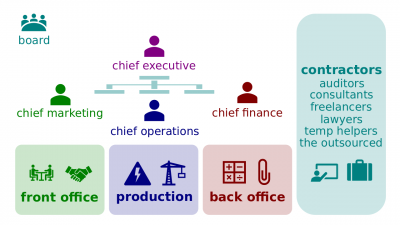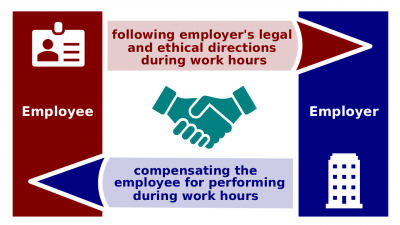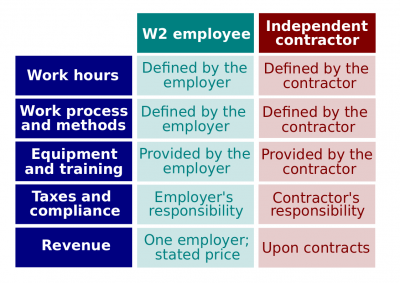Difference between revisions of "Work Sellers"
| Line 23: | Line 23: | ||
:''Independent contractors'' are [[self-employed]]; they are their own [[employer]]s. | :''Independent contractors'' are [[self-employed]]; they are their own [[employer]]s. | ||
| − | :''Independent contractors'' provide their [[customer]]s with their [[ | + | :''Independent contractors'' provide their [[customer]]s with their [[marketable]]s, usually, [[service]]s, rather than with their [[work time]]. Unlike ''employees'', the ''contractors'' deliver what their [[contract]] specifies and they don't need to report the customers how the work is done and when the work is done. |
:The [[IRS|United States Internal Revenue Service]], which is better known by its acronym, [[IRS]], distinguishes ''employees'' and ''independent contractors'' for tax purposes. In the [[United States]], employers pay taxes for the employees, while the [[self-employed]] are responsible for their own taxes. | :The [[IRS|United States Internal Revenue Service]], which is better known by its acronym, [[IRS]], distinguishes ''employees'' and ''independent contractors'' for tax purposes. In the [[United States]], employers pay taxes for the employees, while the [[self-employed]] are responsible for their own taxes. | ||
Revision as of 17:49, 18 June 2020
Work Sellers (hereinafter, the Lectio) is the second lesson part of the Employment Essentials lesson that introduces its participants to employment and related topics.
This lesson belongs to the Introduction to Employment session of the CNM Cyber Orientation. The Orientation is the second stage of the WorldOpp Pipeline.
Content
The predecessor lectio is What Employment Is.
Key terms
- Worker. Any individual who is in the business of selling his or her work time to employers. The sellers include employees, employment candidates, and pretty much every seller on the job market.
- Employee (in the United States, also known as a W2-employee). Any individual employed by an employer for some compensation that most likely includes wages or a salary.
- Independent contractor (in the United States, also known as a 1099-form worker) is a contractor, who is an individual who provides any legal entity with his or her marketables, usually, services. The Contractor's products are specified under terms of a contract or a verbal agreement.
- Self-employed. The state of working for oneself as a freelance or the owner of a business rather than for an employer.
Script
- Employees sell their work or, to be more precise, their work time, to employers. Nonetheless, not all workers are employees. Those workers who are not employees are either (a) independent contractors or (b) volunteers.
- Independent contractors are self-employed; they are their own employers.
- Independent contractors provide their customers with their marketables, usually, services, rather than with their work time. Unlike employees, the contractors deliver what their contract specifies and they don't need to report the customers how the work is done and when the work is done.
- The United States Internal Revenue Service, which is better known by its acronym, IRS, distinguishes employees and independent contractors for tax purposes. In the United States, employers pay taxes for the employees, while the self-employed are responsible for their own taxes.
- Those contractors who work for different organizations, rather than working all the time for a single organization are known as freelancers.
- Self-employment is the state of working for oneself as a business owner, entrepreneur, independent contractor, or, in some circumstances, volunteer rather than for an employer.
Volunteer Workers is the successor lectio.
Questions
Lectio quiz
- The answer is recorded for the lectio completion purpose:
- Is the difference between an employee and independent contractor explained well? --Yes/No/I'm not sure/Let me think/Let's move on




